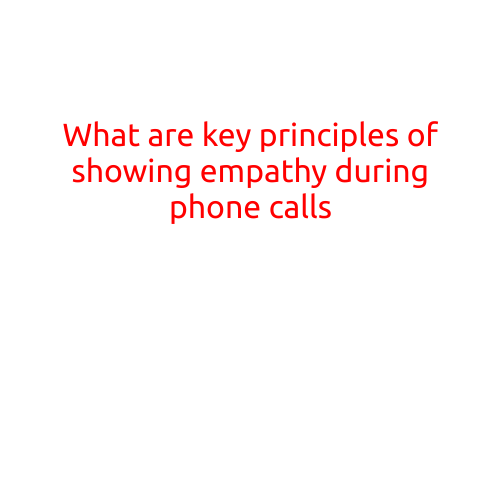
What are the Key Principles of Showing Empathy During Phone Calls?
Effective communication is at the heart of building strong relationships, and phone calls are no exception. When we engage with others over the phone, empathizing with their concerns and emotions is crucial. Empathy is the foundation of building trust, resolving conflicts, and fostering deeper connections with others. In this article, we’ll explore the key principles of showing empathy during phone calls, helping you become a more compassionate and understanding communicator.
1. Active Listening
The first step in showing empathy during a phone call is to actively listen to the other person. Give them your undivided attention, focusing on their words, tone, and body language (even though you can’t see them, try to imagine how they might be feeling). Avoid interrupting, nodding off, or mentally planning your response while they’re speaking. Make eye contact (by looking at your screen or an object near you) to demonstrate engagement and understanding.
2. Verify Understanding
Repeat back what you’ve understood from the conversation to ensure you grasp the other person’s concerns accurately. This shows that you’re paying attention and helps to prevent misunderstandings. For example, “Just to make sure I understand, you’re saying that…?”
3. Acknowledge Their Emotions
Empathize with the other person’s emotions by acknowledging them. You don’t have to agree with their perspective, but you should acknowledge their feelings and show understanding. Use phrases like “I can imagine how difficult this must be for you” or “That sounds really tough; I’m sorry you’re going through this.”
4. Show Empathy through Your Tone
Your tone of voice plays a crucial role in conveying empathy. Speak softly and gently, avoiding a confrontational or dismissive tone. Use a sympathetic and understanding inflection to show that you’re genuinely interested in the other person’s concerns.
5. Avoid Giving Advice
While it’s natural to want to offer solutions, avoid giving advice during a phone call, especially if it’s not asked for. This can come across as condescending or dismissive of the other person’s emotions. Instead, ask open-ended questions to encourage the other person to share their thoughts and feelings.
6. Be Present
Being present in the moment is essential for showing empathy during phone calls. Put away distractions, like your phone or tablet, and focus on the conversation. Make an effort to be fully engaged and engaged in the conversation.
7. Practice Patience
Phone calls can sometimes be frustrating or challenging, both for the caller and the recipient. Practice patience and remain calm, even in the face of disagreement or strong emotions. This will help create a more positive and empathetic environment.
8. Follow Up
After the phone call, take a moment to reflect on the conversation and the emotions expressed. Follow up with a brief email or message to reiterate your understanding and support. This shows that you’re genuinely committed to the relationship and care about the other person’s well-being.
In conclusion, showing empathy during phone calls requires a combination of active listening, verification, acknowledgment, and patience. By implementing these key principles, you’ll become a more effective and compassionate communicator, leading to stronger relationships and a deeper understanding of others. Remember, empathy is a powerful tool that can bring people together, resolve conflicts, and foster a sense of connection and community.





